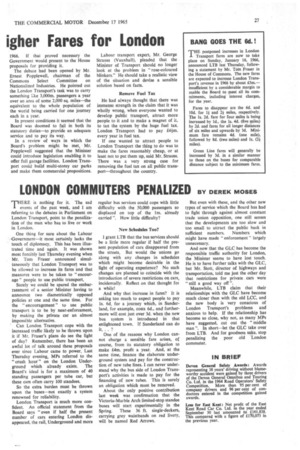LONDON COMMUTERS PENALIZED BY DEREK MOSES T HERE is nothing for
Page 29

If you've noticed an error in this article please click here to report it so we can fix it.
it. The sad events of the past week, and I am referring to the debates in Parliament on London Transport, point to the penalization of the man who has to live or work in London.
One thing for sure about the Labour Government—it most certainly lacks the touch of diplomacy. This has been illustrated time and again. It was shown most forcibly last Thursday evening when Mr. Tom Fraser announced simultaneously that London Transport was to be allowed to increase its fares and that measures were to be taken to " encourage " people to use public transport.
Surely we could be spared the embarrassment of a senior Minister having to announce two diametrically opposed policies at one and the same time. For the "encouragement" to use public transport is to be by near-enforcement, by making the private car an almost impossible alternative.
Can London Transport cope with the increased traffic likely to be thrown upon it if Mr. Fraser's plans do see the light of day? Remember, there has been an awful lot of talk around these proposals ever since Labour came to power. Last Thursday evening, MPs referred to the "crush hour " on the London Underground which already exists. The Board's ideal is for a maximum of 40 standing passengers per tube car, but these cars often carry 100 standees.
So the extra burden must be thrown upon the buses—not exactly a system renowned for reliability.
London Transport is much more confident. An official statement from the Board says "even if half the present number of cars entering London disappeared, the rail, Underground and more regular bus services could cope with little difficulty with the 50,000 passengers so displaced on top of the 1m. already carried ". How little difficulty?
New Schedules Too?
I grant LTB that the bus services should be a little more regular if half the present population of cars disappeared from the streets. But would the unions go along with any changes in schedules which might become desirable in the light of operating experience? No such changes are planned to coincide with the introduction of severe restrictions on cars, incidentally. Reflect on that thought foi a while!
And why that increase in fares? It is asking too much to expect people to pay is, 6d. for a journey which, in Sunderland, for example, costs 6d., and furthermore will cost just over 3d. when the new bus system is introduced in that enlightened town. If Sunderland can do it. . . ?
One of the reasons why London cannot charge a sensible fare arises, of course, from its statutory obligation to make £4m. profit a year. And, at the same time, finance the elaborate underground system and pay for the construction of new tube lines. I can never understand why the bus side of London Transport's activities is made to pay for the financing of new tubes. This is surely an obligation which must be removed.
About the only positive contribution last week was confirmation that the Victoria-Marble Arch limited-stop standee buses will start experimentally in the Spring. These 36 ft. single-deckers, carrying grey waistbands on red livery, will be named Red Arrows. But even with these, and the other new types of service which the Board has had to fight through against almost constant trade union opposition, one still senses that the developments are too slow and too small to attract the public back in sufficient numbers. Numbers which might have made "enforcement" largely unnecessary.
And now that the GLC has become the responsible traffic authority for London, the Minister seems to have lost touch. He is to have further talks with the GLC, but Mr. Stott, director of highways and transportation, told me just the other day that restrictions for private cars were "still a good way off ".
Meanwhile, LTB claim that their relationships with the GLC have become much closer than with the old LCC, and the new body is very conscious of London Transport's problems and anxious to help. If the relationship has become so close, why not, as many MPs have suggested, cut out the "middle man ". In short—let the GLC take over from LTB. And for goodness sake, stop penalizing the poor old London commuter.












































































































